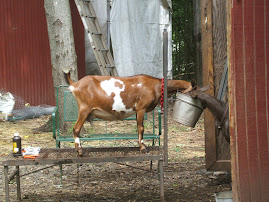
Halloumi is a wonderful and unusual cheese. It originated in Cyprus and is popular all over the Middle East, Greece, and Turkey. This cheese is unlike other cheeses because it can be flambeed, fried, grilled, broiled and baked without losing its texture and shape. Halloumi is not the only cheese which can be fried but it may be the oldest.
When enjoying Halloumi it is not necessary to apply heat, it can be enjoyed as is right out of the box. This cheese will be squeaky on your teeth before frying and more so after frying. You can use this cheese fresh in place of Feta and is often served with watermelon. But the real glory of this cheese does not surface until heat is applied.
This cheese can be enjoyed for breakfast, lunch, dinner, and even dessert. You can stud the Halloumi with pine nuts and fry it, or toss with garlic, lemon and dill and grill it. You can sweeten it up by serving the cheese with a drizzle of honey, sprinkled with almonds, mint, and grilled peaches. It is great with olives, seafood, and veggies. It is also popular for breakfast with bacon and eggs. Halloumi can be chucked, skewered, and grilled like a cheese kabob. If you are BBQing this summer and worried that some vegetarians might crash the meat fest, this will make them happy.

This cheese can do almost anything but melt. I usually do not advocate the freezing of cheese but http://www.cyprushalloumi.com/ states it can be "frozen for up to one year". They also suggest grating it on pasta, salads, and using it as a ravioli filling. This cheese will pair well with a minerally Sauvignon Blanc as well as a fruity Chenin Blanc, a medium bodied Pinot Grigio, and a light Edelzwicker Wines from Alsace.
When making Halloumi, the curds are cut and pressed into molds then removed from the molds and reheated in hot water or whey. The warm cheese is kneaded by hand and shaped. This is very similar to making mozzarella or pasta filata cheeses. The cheese is often sprinkled with mint but I have yet to find that it imparts any noticeable flavor. It may have been used at one time to tell how fresh the cheese was like burrata being wrapped in a leaf. If the leaf was brown the cheese was old. In these modern times, Halloumi is vacuum packed with a much longer shelf life.
Halloumi can be enjoyed the day after it is made but is often ripened for about a month. Halloumi is a salty cheese but you can make it less salty by soaking the cheese in water. I have tried two types of Halloumi, Shepherd of Cyprus 100% Sheep's milk Halloumi and Mt. Vikos Halloumi which is a blend of sheep and goat's milk. I much preferred the Shepherd of Cyprus Halloumi. It had a better texture, flavor, and browning. The Mt. Vikos was a little gritty.

Halloumi is a protected cheese which can only be made on Cyprus. They take their Halloumi very seriously and have a Halloumi police force. They make sure that Halloumi is being made within regulations and using traditional methods. There was an uproar recently when it became known that many producers were making this cheese entirely from cow's milk. The Sheep and Goat Farmer's Association is also working to remove the term Halloumi from low fat and light options that are being marketed.
Halloumi is made with sheep's milk and can be blended with goat's milk and cow's milk. As of 1985 when a law was passed, cow's milk cannot exceed the percentage of goat's milk. But there seems to be some debate regarding the interpretation of current standards for Halloumi production. Standards may not change soon as that would affect the pending application with the European Commission for a Product of Designated Origin.
Sidqui Effendi was a Turkish writer who wrote a cookbook and called Halloumi a "good food which enhances sex". I cannot see any scientific reasoning behind that comment but it is amusing. But maybe we need to conduct some studies on this matter, maybe there is a grant out there for some such study....If you conduct any research of your own, please tell us all about it by commenting below!
























It's great to see my cheese on your blog. I am from Cyprus and yes we "own" halloumi there :-)
ReplyDeleteTurks call it "hellim" and not sure about enhancing sex. That's new to me. :-))
I wanted to share that when I can't find the real thing or when it's too expensive, I use queso blanco instead. It's a great substitute.
Oya Simpson
The best is a grilled halloumi, cucumber & tomato with S&P sandwich on crusty bread. No meat necessary.
ReplyDeleteCool and that i have a keen present: How Much Is House Renovation Loan In Pag Ibig small home renovations
ReplyDelete